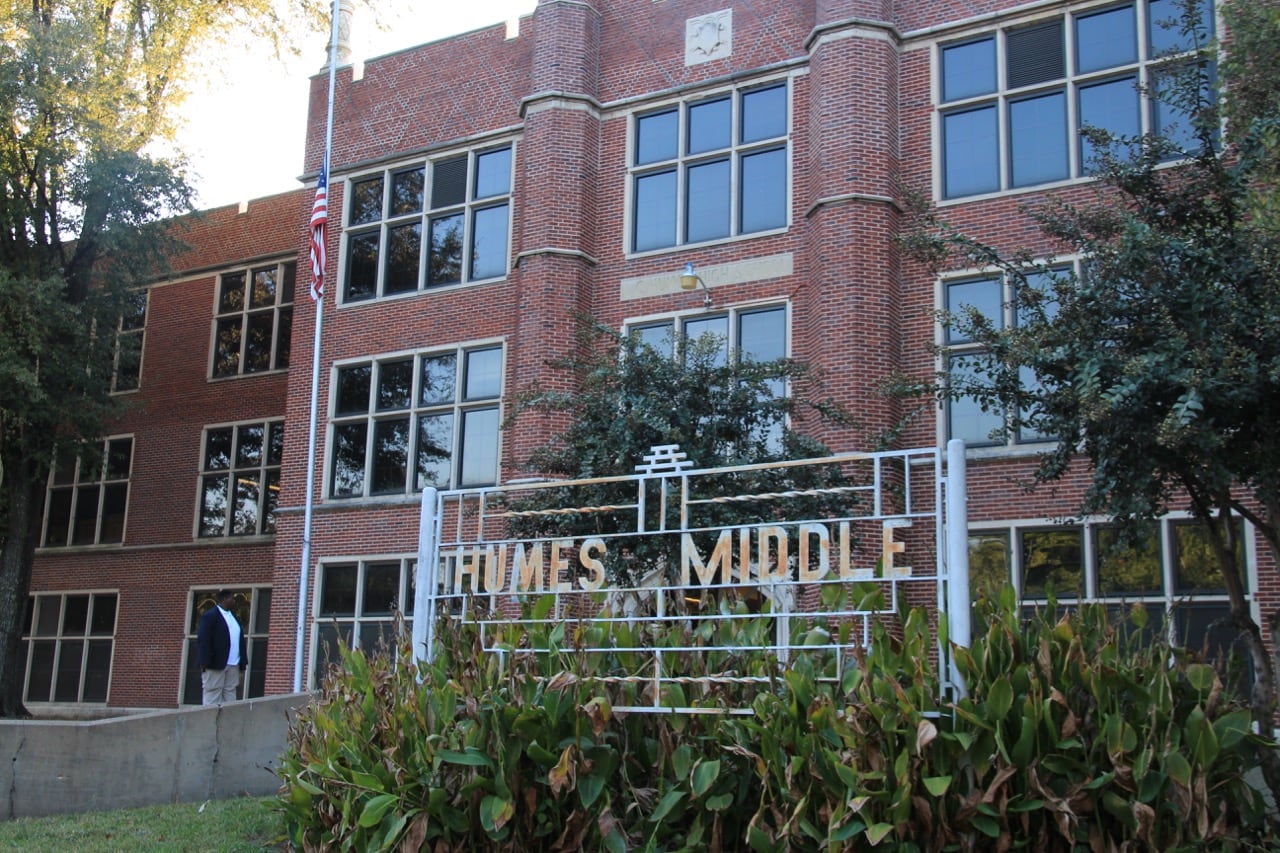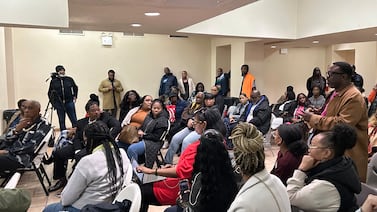Sign up for Chalkbeat Tennessee’s free daily newsletter to keep up with the Memphis-Shelby County Schools and statewide education policy.
Several of Memphis’ lowest performing schools face an uncertain future — and possible closure — as their charter agreements with Tennessee’s turnaround district near expiration.
Five of them, including MLK College Prep High School, are seeking approval to return to Memphis-Shelby County Schools as charter schools after a decade in the state-run Achievement School District. But MSCS officials have recommended denying their charter applications, along with bids from four proposed new charter schools.
If the MSCS board votes to accept the district’s recommendations and deny the charters when it meets Tuesday, it would leave some 2,000 students with high academic needs in limbo, unsure of where they’ll attend classes in the 2024-25 school year.
Another web of decisions would determine what happens next to those students, and to the schools. So far, neither the district nor the board has articulated a comprehensive strategy for dealing with the fallout of the ASD’s collapse.
“We should have talked about this two years ago, since we all knew it was coming,” said Bobby White, head of the charter company that runs MLK College Prep.
MSCS officials have said they talk to operators and tailor individual decisions because “each school in the ASD is unique.”
The board could defy the district recommendations and approve the charters, as it has done before. But the district argues that it’s not in its interest to bring poorly performing charter schools back into the district. This year, all five applicants bear the same low-performing “priority” designation that primed them for state takeover a decade ago.
“We want high quality seats for our students,” said Brittany Monda, MSCS’ assistant superintendent of charter schools.
ASD schools could close
When the state assigned its lowest-performing public schools — most of them in Memphis — to the Achievement School District, the idea was that charter operators would take them over, turn them around, and eventually return the schools to the home districts in better shape.
But the plan didn’t work. Many of the schools languished or continued to perform poorly under the charter operators. That means that despite 10 years of state oversight, most do not meet state and local performance standards used by local officials to evaluate charter applications.
Data presented by MSCS indicates that despite some gains over the years, each of the five schools has fewer than 12% of students on track in reading and math.
State law allows Tennessee school boards to close charter schools in their own portfolios that have priority designations, and that could happen in Memphis if the MSCS board accepts the ASD schools and they don’t make significant academic gains. Memphis policy favors new charter schools that would give other options to students who go to a low-performing school.
If the board turns down the ASD schools, MSCS could decide to resume operating them as traditional schools. Otherwise, the ASD schools would close when their charters expire at the end of the 2023-24 school year.
MSCS facilities plan complicates unraveling of ASD
It’s no surprise that MSCS is wary of assuming responsibility for more schools. District leaders have been trying over the past decade to align school capacity with shifts in enrollment, and to figure out how to improve the condition of decaying school buildings. Facility plans have been continually revised in recent years, but have never been fully executed.
Consolidating schools that are operating under capacity would offer better learning environments for students, officials say, and cut down on a costly list of building repair projects.
Interim Superintendent Toni Williams is poised to deliver a new facilities plan next month. The ASD charter schools — operating in buildings MSCS still owns — could be part of this plan.
Already, the district is planning for a new Frayser high school that would combine students at Trezevant High School and MLK College Prep. The district plans to build it at the MLK site.
White, the leader of MLK College Prep’s charter operator, Frayser Community Schools, has said that if the MSCS board approves the charter school, he would end the charter agreement early, when it’s time for students at MLK College Prep to move into the new building.
But if the school isn’t approved as a charter, the district will have to choose between operating it or letting it close. If it closes, students currently zoned to MLK College Prep would have to be reassigned to Trezevant or other schools until a new high school is built.
Stephanie Love, a school board member and longtime advocate for students in the ASD, peppered district officials with questions about school closures and consolidations during a committee meeting last week.
She pointed out that the district makes decisions to close and consolidate traditional schools based on academic performance, enrollment, and school building needs — criteria similar to the ones it uses to evaluate charter schools.
Many ASD schools have closed already without any MSCS school board vote.
If the five ASD schools seeking charter approvals eventually return to the district as traditional schools, they could become part of MSCS’ own turnaround model, called the Innovation Zone, or iZone. The model takes advantage of centralized resources and pays teachers more for working a longer day.
A handful of former ASD schools joined the iZone last year, as traditional MSCS schools, and another will join this school year. Monda, the charter office leader, said the returned schools have shown “promising results,” but did provide any data. (Charter schools cannot be part of the iZone.)
Charter operators may have a chance to appeal or reapply
Tuesday’s board vote on the five ASD schools — and the four new applicants — won’t be the end of the story for any of them.
If they lose their bids for charter approval, they could appeal the decision to the Tennessee Public Charter School Commission, or in some cases reapply next year.
White, the ASD charter operator, said that if the board turns down his applications, he doesn’t plan to appeal. He said he wants to support the district’s plan for Memphis students. But he said there should have been a more comprehensive plan for the schools serving the Memphis and Tennessee students who have struggled the most academically.
“Our contracts say our time is up after the 10th year,” he said. “And I’m hoping that we have an opportunity after this round … to really dig in on what’s going to happen to … all the other schools coming back in the years to follow.”
Another set of ASD schools serving about 2,000 more students have charters set to expire in coming school years.
Laura Testino covers Memphis-Shelby County Schools for Chalkbeat Tennessee. Reach Laura at LTestino@chalkbeat.org.






